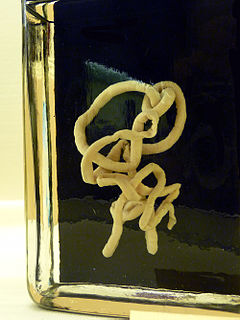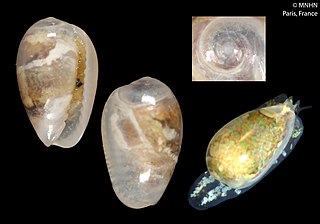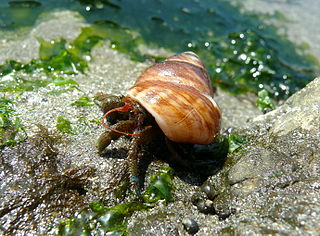
Lineus is a genus of nemertine worms, including the bootlace worm, arguably the longest animal alive. Lineus contains the following species:

The Megatherium Club was founded by William Stimpson. It was a group of Washington, D.C.-based scientists who were attracted to that city by the Smithsonian Institution's rapidly growing collection, from 1857 to 1866.

William Stimpson was a noted American scientist. He was interested particularly in marine biology. Stimpson became an important early contributor to the work of the Smithsonian Institution and later, director of the Chicago Academy of Sciences.

Rissooidea, originally named Rissoacea by Gray, 1847, is a taxonomic superfamily of small and minute marine snails, belonging to the clade Littorinimorpha.

Littorinimorpha is a large order of snails, gastropods, consisting primarily of sea snails, but also including some freshwater snails and land snails.

Buccinoidea is a taxonomic superfamily of very small to large predatory sea snails, marine gastropod mollusks.

Loxorhynchus is a genus of crabs of the eastern Pacific Ocean in the family Epialtidae.

Mediaster aequalis is a species of sea star in the family Goniasteridae. It is native to the west coast of North America, ranging from Alaska to California. It is found in various habitats including beaches during very low tides, and at depths down to about 500 m (1,600 ft). Also known as the vermilion sea star, it is the type species of the genus Mediaster and was first described in 1857 by the American zoologist William Stimpson.

Cystiscidae is a taxonomic family of minute sea snails, marine gastropod mollusks or micromollusks.

Caecum is a genus of minute sea snails, marine gastropod micromolluscs or micromollusks in the family Caecidae or blind shells.
James Stimpson was a British cathedral organist and Birmingham City Organist.

Inachidae is a family of crabs, containing 39 genera:

The Joubin Islands are a group of small islands lying 6 kilometres (3 nmi) south-west of Cape Monaco, Anvers Island, at the south-western end of the Palmer Archipelago of Antarctica. The islands were discovered by the French Antarctic Expedition, 1903–05, under Jean-Baptiste Charcot, and named by him for Louis Joubin, the French naturalist. They have been designated a Restricted Zone under ASMA 7 — Southwest Anvers Island and Palmer Basin — which includes the marine area extending 50 metres (55 yd) from the shorelines.
Leucosiidae is a family of crabs containing three subfamilies and a number of genera incertae sedis:

Pagurus samuelis, the blueband hermit crab, is a species of hermit crab from the west coast of North America, and the most common hermit crab in California. It is a small species, with distinctive blue bands on its legs. It prefers to live in the shell of the black turban snail, and is a nocturnal scavenger of algae and carrion.

Acotylea is a suborder of free-living marine turbellarian flatworms in the order Polycladida.
Truncatelloidea is a superfamily of snails, gastropod mollusks in the clade Caenogastropoda.
Mediaster is a genus of starfish in the family Goniasteridae. It was circumscribed in 1857 by William Stimpson for M. aequalis, the genus's type species. Its junior synonym is the genus Isaster, which was circumscribed in 1894 by Addison Emery Verrill for the species now known as M. bairdi. Verrill himself synonymized the two genus names in 1899.
Emplectonema is a genus of worms belonging to the family Emplectonematidae.
Valenciniidae is a family of worms belonging to the order Heteronemertea.













